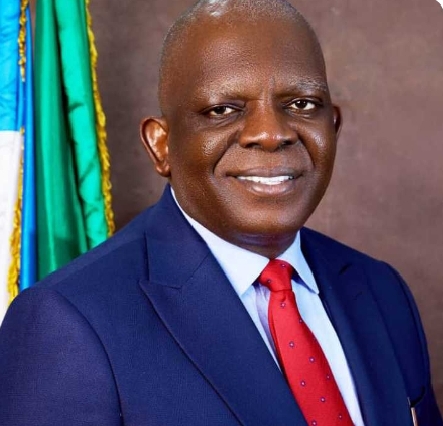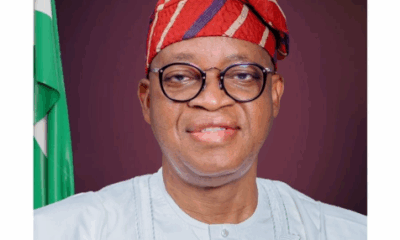Maritime
Shippers’ Council Devise Strategic Plan To Deliver On Performance Bond

Akutah Reads Riot Act, Frowns At Prevailing Cargo Dwell Time
BY EGUONO ODJEGBA
In a bid to deliver strongly on its mandate and in line with the recent performance bond extracted from the heads of all agencies and parastatls under the Federal Ministry of Marine and Blue Economy, the Nigerian Shippers’ Council (NSC) Wednesday, July 23, 2025, unveiled a Strategic Plan designed to guide its operations aimed at providing an end-to-end template for the achievement of its overall objectives, vision and mission.
The Strategic Plan which was unveiled during the Council’s Management System Retreat by the Executive Secretary/CEO, Barr. Pius Ukeyima Akutah in Lagos, highlights marked institutional engagements tailored to achieve the Council’s work-plans and expectations for the next five years.
Apparently determined and passionate, Akutah literarily read the riot act, as he charged directors, deputy directors, heads of departments downwards to unit heads to ensure the success of the current job delineation and realignments; insisting they will be held accountable for every action and inaction going forward; insisting that there is no room for failure or half measures.
Delivering his keynote address during the retreat, the NSC Boss commended the Renewed Hope Agenda of President Bola Ahmed Tinubu and the bold initiative of the Minister of Marine and Blue Economy, Gboyega Oyetola at offering the desired directives towards achieving the aims and objectives of the federal government.
According to Akutah, “Under Mr. President’s direction, the Federal Government has made an unambiguous statement through the creation of the Federal Ministry of Marine and Blue Economy – entrusted with transforming Nigeria’s vast ocean economy into a catalyst for diversification, growth, and sustainability.
“We are equally privileged to be under the astute leadership of the Honourable Minister of Marine and Blue Economy, His Excellency Adegboyega Oyetola, CON, whose visionary approach, steady guidance, and tireless commitment have galvanized key institutions within the sector, including our own Council, to embrace innovation, reform, and measurable impact”, he said.
While revealing out the essential components of the strategic plan, Akutah noted that the Council is more poised than ever to promote automation and modernization of its processes as well as ensuring that critical stakeholders not only play by the rules but remain fully integrated in the port system digitalization culture.
“The Nigerian Shippers’ Council can no longer afford to operate as a process-heavy, paper-driven bureaucracy. We must now define our success not by our activities, but by our outcomes. Not by intentions, but by results.
“The Federal Government, through its National Policy on Marine and Blue Economy, has placed performance at the centre of national development. It is a call for institutions like ours to show leadership in: Facilitating trade, Improving port efficiency, Strengthening inter-agency coordination, Accelerating port infrastructure delivery, Enhancing stakeholder confidence, and Mainstreaming sustainability across the logistics value chain
“The Strategic Plan (2025–2029) developed by the Council, and the retreat that convenes us here today, reflect our response to that call. I wish to now outline our strategic imperatives and issue clear policy directives to guide implementation over the next five years.
“The Council must serve as both a policy anchor and delivery vehicle in support of the Ministry’s goals. Our mandates align with the policy’s strategic thrusts, including trade logistics, cargo management, and port infrastructure development.
“All departments – particularly Legal Services, Strategic Planning, & Research, Regulatory Services, Consumer Affairs, Inland Transport Services, and Zonal Coordinators, are to align annual workplans with relevant components of the national policy. Quarterly reports evidencing this alignment shall henceforth be submitted to the ES/CEO’s Office and transmitted to the Ministry.

“Current cargo dwell time and vessel turnaround statistics at our ports remain unacceptable. We must work to ensure that cargo clearing timelines in Nigerian ports are reduced to match regional benchmarks.
“By the end of Q3 2025, all internal memos, approvals, correspondences, and record-keeping must migrate to the ECM platform. Any department that fails to comply will face administrative sanctions. Infrastructure remains central to our mandate.”
This is even as he provided updates on critical projects and programmes of the Council listed for completion as part of the Council’s job template considered significant for driving its performance bond signed with the federal government on MAY 14, 2025.
“Projects such as the Jos Inland Dry Port, Gateway IDP (Ogun), Kano Dala IDP, Potiskum VTA, and Border Information Centres must move beyond paperwork and into full execution.
“The Inland Transport Services Department, PPP and relevant zonal coordinators are to provide fortnightly progress reports. The ES/CEO will personally monitor project timelines, budget adherence, and stakeholder engagement.
“A regulator that is not responsive to its stakeholders loses legitimacy. We must engage constructively, communicate clearly, and act decisively. The PR Unit, Consumer Affairs Department, and Strategic Planning Department must institutionalise quarterly stakeholder forums, release public-facing regulatory newsletters, and establish a formal complaint-resolution tracker.
He continues by identifying other urgent plans deemed necessary to catapult the overall success of the Council’s mandate, through fresh motivational ideas, he promised to lead and direct from his office.
“Colleagues, no institution is stronger than its people. This administration will prioritise talent development, onboarding, mentorship, and welfare. HRM must roll out a structured induction process for all new staff within 30 days of employment. Additionally, the Council will institutionalise a Leadership and Innovation Development Series for senior officers, starting from Q3 2025.
“We must now move from good intentions to disciplined execution. From this retreat, I expect that every Director, Deputy Director, and Unit Head will return with a clear action plan, a revised mindset, and a renewed sense of urgency.
“The Office of the Executive Secretary shall provide the platform, tools, and support. But I shall also demand full compliance, regular reporting, and visible transformation in every department and unit. As I have often said: performance is not an option. It is the new culture.”
Passionate, Akutah also used the opportunity to express concerns over the current cargo dwell time in addition to the turnaround time of vessels calling Nigerian ports, stating that the statistics for both vessel turnaround time and cargo dwell time is unacceptable and must improve and charged those involved to double up to close the efficiency gaps.
“Our recent strategic planning session was not merely a routine exercise. It was a participatory and reflective engagement designed to realign our institutional vision, mission, and goals especially with current transitional period and future expectations.”
Speaking earlier on the Council’s Strategic Plan, the Director of Strategic Planning and Research Department, Mr. Rotimi Anifowoshe said the plan is more than just an idea but a new way of doing things.
“Our recent strategic planning session was not merely a routine exercise. It was a participatory and reflective engagement designed to realign our institutional vision, mission, and goals especially with current transitional period and future expectations.
“The insights, ideas, and recommendations gathered during that session have been meticulously documented in the draft report, which we are here today to validate,” the essential director of strategic planning and research said.



































